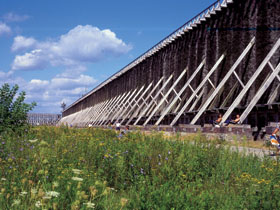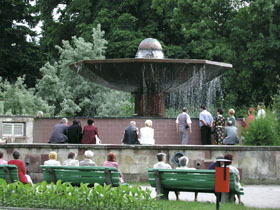Natural curative resources
 Natural resources of Ciechocinek are the abounding deposits of thermal brines, which thanks to the presence of sodium chloride, calcium compounds, magnesium compounds, iron compounds, free sulphuretted hydrogen, iodine, bromine and other trace elements, have extraordinary curative qualities. Their temperature is from 8 to 370°C, and their salinity – from 0,19% to 6,43%. Since 1841, as the first intake of brine has been bored 19 further exploitation intakes have been carried out.
Natural resources of Ciechocinek are the abounding deposits of thermal brines, which thanks to the presence of sodium chloride, calcium compounds, magnesium compounds, iron compounds, free sulphuretted hydrogen, iodine, bromine and other trace elements, have extraordinary curative qualities. Their temperature is from 8 to 370°C, and their salinity – from 0,19% to 6,43%. Since 1841, as the first intake of brine has been bored 19 further exploitation intakes have been carried out.
At present following brine bore-holes are being utilized:
Bore hole 11 (Grzybek)
4,51% chloride–soda water (brine), bromide water, iodide water, boronide water, fluoride water
Bore hole no 17
0,79% chloride–soda water, bromide water, bromide water, boronide water
Bore hole no 17a
0,19% chloride–carbohydrate–soda-calcium water
Bore hole no 17b
0,22% chloride-soda water, bromide water
Bore hole no 19
0,33% chloride-soda water
Bore hole no 19a
0,35% chloride-soda water
Thermal spring XIV
4,43% hypothermal (27°C) bromide water, iodide water, boronide water, sulfide water
Thermal spring XVI
6,43% hypothermal (33°C) bromide-iodide-ferruginous-boronide water
(Source: “Projekt Zagospodarowania Złóż Wód Leczniczych w Ciechocinku” (“Ciechocinek’s Curative Water Deposits’ Utilization Project”) PPUH „Hydrogeo Ltd”, Wrocław 1995.
The brine is utilized for healing baths, its influence onto the human organism depends upon the activity of the chemical, thermical and hydrostatic factor. With a suitable concentration, the same mineral water is used for individual or group inhalations as well as for irrigation. Spring no 19 delivers water of 11% concentration, which is bottled as mineral water “Krystynka” and “Kujawianka”.
Copyrights 2000-2026 Urząd Miejski w Ciechocinku, ul. Kopernika 19
tel.: 54 - 416 18 00, 283 64 58, fax: 54 - 283 64 23, e-mail: ratusz@ciechocinek.pl















































